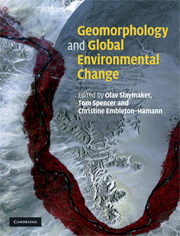Book contents
- Frontmatter
- Contents
- List of contributors
- Preface
- Acknowledgements
- List of acronyms and abbreviations
- 1 Landscape and landscape-scale processes as the unfilled niche in the global environmental change debate: an introduction
- 2 Mountains
- 3 Lakes and lake catchments
- 4 Rivers
- 5 Estuaries, coastal marshes, tidal flats and coastal dunes
- 6 Beaches, cliffs and deltas
- 7 Coral reefs
- 8 Tropical rainforests
- 9 Tropical savannas
- 10 Deserts
- 11 Mediterranean landscapes
- 12 Temperate forests and rangelands
- 13 Tundra and permafrost-dominated taiga
- 14 Ice sheets and ice caps
- 15 Landscape, landscape-scale processes and global environmental change: synthesis and new agendas for the twenty-first century
- Index
15 - Landscape, landscape-scale processes and global environmental change: synthesis and new agendas for the twenty-first century
Published online by Cambridge University Press: 05 July 2015
- Frontmatter
- Contents
- List of contributors
- Preface
- Acknowledgements
- List of acronyms and abbreviations
- 1 Landscape and landscape-scale processes as the unfilled niche in the global environmental change debate: an introduction
- 2 Mountains
- 3 Lakes and lake catchments
- 4 Rivers
- 5 Estuaries, coastal marshes, tidal flats and coastal dunes
- 6 Beaches, cliffs and deltas
- 7 Coral reefs
- 8 Tropical rainforests
- 9 Tropical savannas
- 10 Deserts
- 11 Mediterranean landscapes
- 12 Temperate forests and rangelands
- 13 Tundra and permafrost-dominated taiga
- 14 Ice sheets and ice caps
- 15 Landscape, landscape-scale processes and global environmental change: synthesis and new agendas for the twenty-first century
- Index
Summary
Introduction: beyond the IPCC Fourth Assessment Report
15.1.1 Changing structures for IPCC-type science
It is difficult to escape from the framing of the climate change debate by the IPCC; indeed, that is where we began at the start of this volume. In each of the Assessment Reports, including the Fourth Assessment Report in 2007, the IPCC methodology has been a strongly ‘top–down’ process, developing a complete set of emissions scenarios, leading to a complete set of climate change scenarios and finally resulting in a range of matching impact and adaptation analyses (Fig. 15.1a). Such an approach is robust and defensible (as it needs to be) because it is underpinned by not only a thorough exploration of the socioeconomic and political forces lying behind the emissions scenarios but also by their subsequent translation into outputs from sophisticated three-dimensional atmosphere–ocean general circulation models (AOGCMs), themselves subject to model intercomparison testing. Model runs in this framework are, however, time-consuming and expensive and the methodological flowchart is cumbersome. This is because of the need to work through each of these stages sequentially to arrive at new impacts from changed emissions scenarios. Within this context, and in beginning the discussion of a possible Fifth Assessment Report, an IPCC Expert Group (Moss et al., 2008) has proposed a so-called parallel approach whereby research into climate projections and emissions and socioeconomic scenarios are decoupled, taking place alongside one another (Fig. 15.1b).
Alongside this model are proposed changes in the role of the IPCC itself; at its meeting in Mauritius in April 2006 the IPCC decided (not, it should be noted, without internal debate) (IISD Reporting Services, 2006), that rather than directly co-ordinating and approving new scenarios itself, it would seek ‘to catalyse the timely production by others of new scenarios for a possible Fifth Assessment Report’. The combination of a new structure and a new approach (and see also Raes and Swart, 2007) thus places emphasis on how the linkages between the different boxes in Fig. 15.1b might be established and maintained.
- Type
- Chapter
- Information
- Geomorphology and Global Environmental Change , pp. 403 - 423Publisher: Cambridge University PressPrint publication year: 2009
- 3
- Cited by



